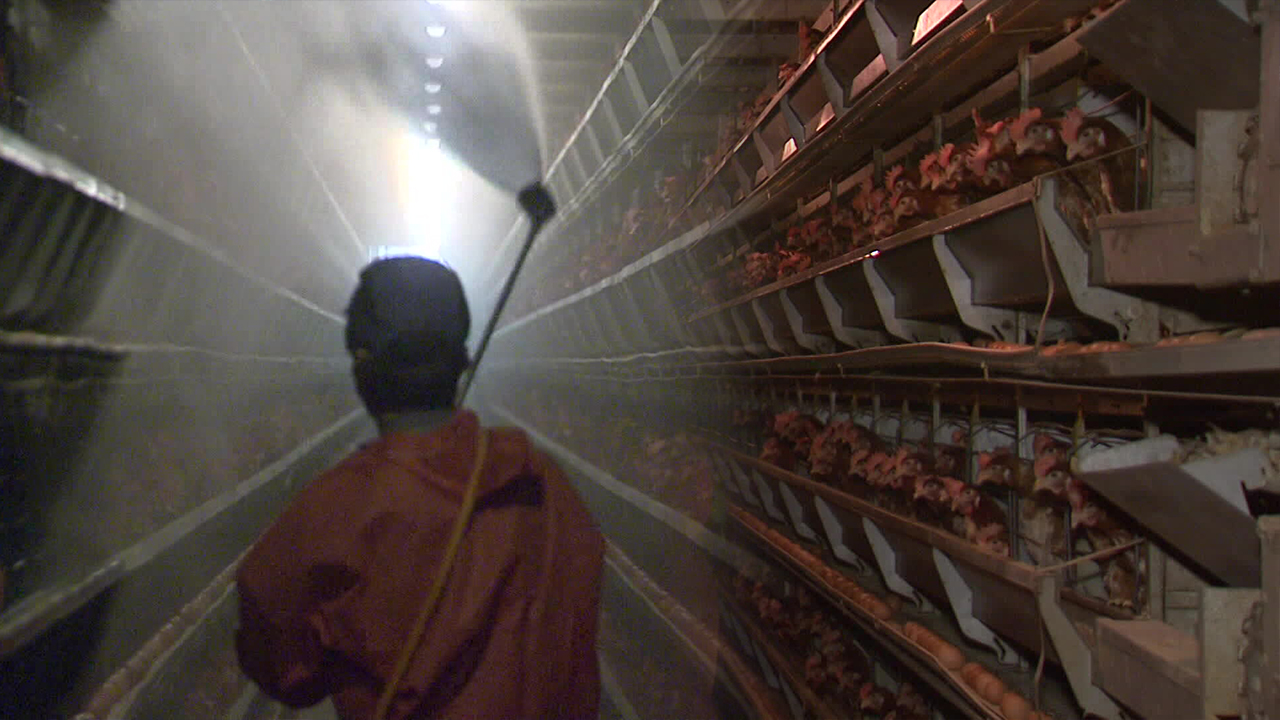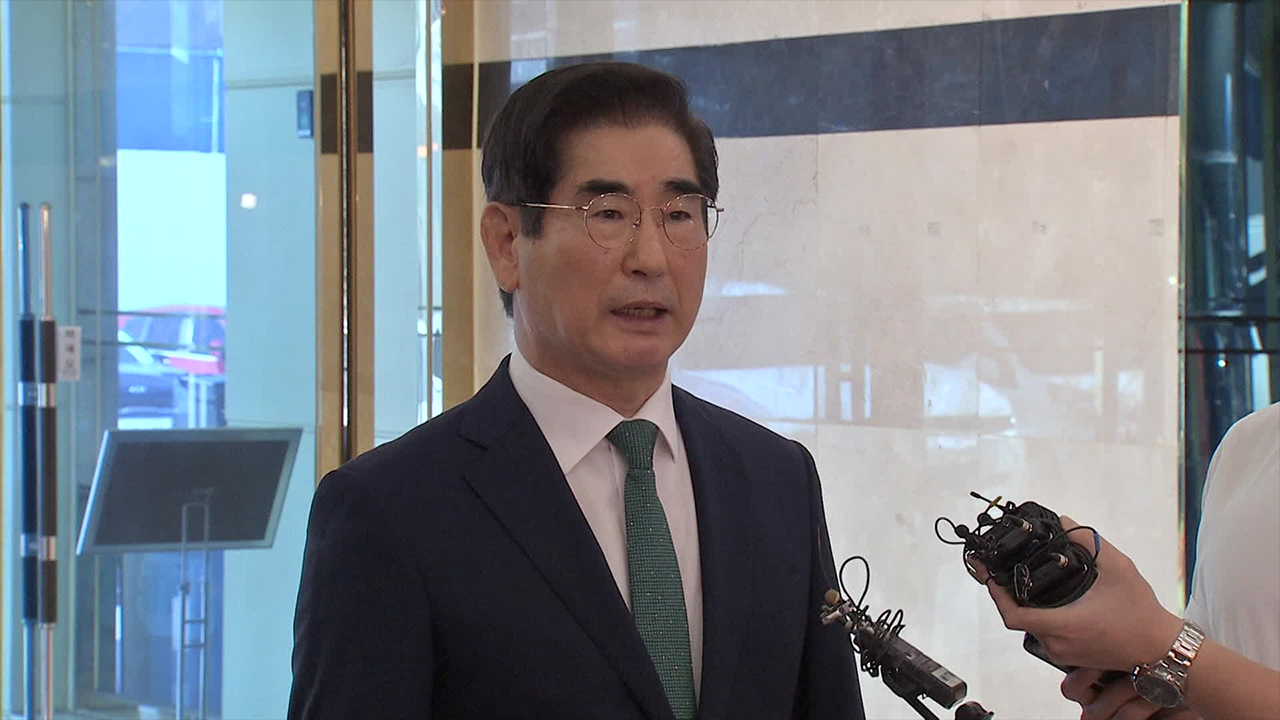Won-dollar exchange rate hits new record high again
입력 2024.12.24 (23:55)
읽어주기 기능은 크롬기반의
브라우저에서만 사용하실 수 있습니다.
[Anchor]
The won-dollar exchange rate has surpassed 1,456 won, setting a new record high.
Since the U.S. Federal Reserve's forecast announcement last week, it has been maintaining in the 1,450 won range for four consecutive trading days.
Now, the 1,500 won level is just around the corner.
With international oil prices rising, the cost of crude oil that needs to be purchased with dollars is also increasing.
In 2 to 3 weeks, this will affect domestic gas station prices.
Gas station prices have already been rising for 10 weeks, and due to the strong dollar, it seems that the upward trend will continue for the time being.
The rise in oil prices, which directly affects various prices, has raised alarms for food prices at the dining table.
Reporter Lee Soo-yeon has the details.
[Report]
A feed truck enters the disinfection facility.
Before going to the farm, it receives a disinfection certificate.
If highly pathogenic avian influenza occurs, a nationwide movement ban follows.
Only vehicles that have received movement approval can come and go.
[Choi Chang-min/Feed truck driver: "We are in a state of complete stop. Feed supply must go in, so we are entering after getting movement approval."]
Half of the highly pathogenic avian influenza cases confirmed this month are from layer poultry farms.
If outbreaks continue, egg prices may rise, and the quarantine authorities are managing supply and demand closely.
[Kim Jong-gu/Director of Agricultural Innovation Policy, Ministry of Agriculture, Food and Rural Affairs: "There is a high possibility of transmission between farms, raising concerns about significant damage. Please complete the comprehensive inspection of layer poultry farms nationwide promptly."]
Strawberry farms, which are in peak season during winter.
Due to the prolonged late heat and continued cloudy days, production has halved compared to last year.
Prices have risen by 30% compared to the average year, putting a burden on consumers while farmers are worried about production costs.
[Lim Min-kyu/Strawberry farmer: "We have to invest more in fertilizers and nutrients, and we have to use more fuel."]
The prices of agricultural and livestock products are a growing concern for the future.
[Seo Jin-kyo/Director of GSnJ Institute: "Due to the high exchange rate, the rise in prices of fertilizers, pesticides, and especially feed that relies on imports is inevitable, which will likely worsen the trading conditions and management of farms, and I believe appropriate government measures are needed for this."]
The prices of processed foods, which rely heavily on imported raw materials, have already begun to rise, threatening food prices for the New Year.
This is KBS News, Lee Soo-yeon.
The won-dollar exchange rate has surpassed 1,456 won, setting a new record high.
Since the U.S. Federal Reserve's forecast announcement last week, it has been maintaining in the 1,450 won range for four consecutive trading days.
Now, the 1,500 won level is just around the corner.
With international oil prices rising, the cost of crude oil that needs to be purchased with dollars is also increasing.
In 2 to 3 weeks, this will affect domestic gas station prices.
Gas station prices have already been rising for 10 weeks, and due to the strong dollar, it seems that the upward trend will continue for the time being.
The rise in oil prices, which directly affects various prices, has raised alarms for food prices at the dining table.
Reporter Lee Soo-yeon has the details.
[Report]
A feed truck enters the disinfection facility.
Before going to the farm, it receives a disinfection certificate.
If highly pathogenic avian influenza occurs, a nationwide movement ban follows.
Only vehicles that have received movement approval can come and go.
[Choi Chang-min/Feed truck driver: "We are in a state of complete stop. Feed supply must go in, so we are entering after getting movement approval."]
Half of the highly pathogenic avian influenza cases confirmed this month are from layer poultry farms.
If outbreaks continue, egg prices may rise, and the quarantine authorities are managing supply and demand closely.
[Kim Jong-gu/Director of Agricultural Innovation Policy, Ministry of Agriculture, Food and Rural Affairs: "There is a high possibility of transmission between farms, raising concerns about significant damage. Please complete the comprehensive inspection of layer poultry farms nationwide promptly."]
Strawberry farms, which are in peak season during winter.
Due to the prolonged late heat and continued cloudy days, production has halved compared to last year.
Prices have risen by 30% compared to the average year, putting a burden on consumers while farmers are worried about production costs.
[Lim Min-kyu/Strawberry farmer: "We have to invest more in fertilizers and nutrients, and we have to use more fuel."]
The prices of agricultural and livestock products are a growing concern for the future.
[Seo Jin-kyo/Director of GSnJ Institute: "Due to the high exchange rate, the rise in prices of fertilizers, pesticides, and especially feed that relies on imports is inevitable, which will likely worsen the trading conditions and management of farms, and I believe appropriate government measures are needed for this."]
The prices of processed foods, which rely heavily on imported raw materials, have already begun to rise, threatening food prices for the New Year.
This is KBS News, Lee Soo-yeon.
■ 제보하기
▷ 카카오톡 : 'KBS제보' 검색, 채널 추가
▷ 전화 : 02-781-1234, 4444
▷ 이메일 : kbs1234@kbs.co.kr
▷ 유튜브, 네이버, 카카오에서도 KBS뉴스를 구독해주세요!
- Won-dollar exchange rate hits new record high again
-
- 입력 2024-12-24 23:55:23

[Anchor]
The won-dollar exchange rate has surpassed 1,456 won, setting a new record high.
Since the U.S. Federal Reserve's forecast announcement last week, it has been maintaining in the 1,450 won range for four consecutive trading days.
Now, the 1,500 won level is just around the corner.
With international oil prices rising, the cost of crude oil that needs to be purchased with dollars is also increasing.
In 2 to 3 weeks, this will affect domestic gas station prices.
Gas station prices have already been rising for 10 weeks, and due to the strong dollar, it seems that the upward trend will continue for the time being.
The rise in oil prices, which directly affects various prices, has raised alarms for food prices at the dining table.
Reporter Lee Soo-yeon has the details.
[Report]
A feed truck enters the disinfection facility.
Before going to the farm, it receives a disinfection certificate.
If highly pathogenic avian influenza occurs, a nationwide movement ban follows.
Only vehicles that have received movement approval can come and go.
[Choi Chang-min/Feed truck driver: "We are in a state of complete stop. Feed supply must go in, so we are entering after getting movement approval."]
Half of the highly pathogenic avian influenza cases confirmed this month are from layer poultry farms.
If outbreaks continue, egg prices may rise, and the quarantine authorities are managing supply and demand closely.
[Kim Jong-gu/Director of Agricultural Innovation Policy, Ministry of Agriculture, Food and Rural Affairs: "There is a high possibility of transmission between farms, raising concerns about significant damage. Please complete the comprehensive inspection of layer poultry farms nationwide promptly."]
Strawberry farms, which are in peak season during winter.
Due to the prolonged late heat and continued cloudy days, production has halved compared to last year.
Prices have risen by 30% compared to the average year, putting a burden on consumers while farmers are worried about production costs.
[Lim Min-kyu/Strawberry farmer: "We have to invest more in fertilizers and nutrients, and we have to use more fuel."]
The prices of agricultural and livestock products are a growing concern for the future.
[Seo Jin-kyo/Director of GSnJ Institute: "Due to the high exchange rate, the rise in prices of fertilizers, pesticides, and especially feed that relies on imports is inevitable, which will likely worsen the trading conditions and management of farms, and I believe appropriate government measures are needed for this."]
The prices of processed foods, which rely heavily on imported raw materials, have already begun to rise, threatening food prices for the New Year.
This is KBS News, Lee Soo-yeon.
The won-dollar exchange rate has surpassed 1,456 won, setting a new record high.
Since the U.S. Federal Reserve's forecast announcement last week, it has been maintaining in the 1,450 won range for four consecutive trading days.
Now, the 1,500 won level is just around the corner.
With international oil prices rising, the cost of crude oil that needs to be purchased with dollars is also increasing.
In 2 to 3 weeks, this will affect domestic gas station prices.
Gas station prices have already been rising for 10 weeks, and due to the strong dollar, it seems that the upward trend will continue for the time being.
The rise in oil prices, which directly affects various prices, has raised alarms for food prices at the dining table.
Reporter Lee Soo-yeon has the details.
[Report]
A feed truck enters the disinfection facility.
Before going to the farm, it receives a disinfection certificate.
If highly pathogenic avian influenza occurs, a nationwide movement ban follows.
Only vehicles that have received movement approval can come and go.
[Choi Chang-min/Feed truck driver: "We are in a state of complete stop. Feed supply must go in, so we are entering after getting movement approval."]
Half of the highly pathogenic avian influenza cases confirmed this month are from layer poultry farms.
If outbreaks continue, egg prices may rise, and the quarantine authorities are managing supply and demand closely.
[Kim Jong-gu/Director of Agricultural Innovation Policy, Ministry of Agriculture, Food and Rural Affairs: "There is a high possibility of transmission between farms, raising concerns about significant damage. Please complete the comprehensive inspection of layer poultry farms nationwide promptly."]
Strawberry farms, which are in peak season during winter.
Due to the prolonged late heat and continued cloudy days, production has halved compared to last year.
Prices have risen by 30% compared to the average year, putting a burden on consumers while farmers are worried about production costs.
[Lim Min-kyu/Strawberry farmer: "We have to invest more in fertilizers and nutrients, and we have to use more fuel."]
The prices of agricultural and livestock products are a growing concern for the future.
[Seo Jin-kyo/Director of GSnJ Institute: "Due to the high exchange rate, the rise in prices of fertilizers, pesticides, and especially feed that relies on imports is inevitable, which will likely worsen the trading conditions and management of farms, and I believe appropriate government measures are needed for this."]
The prices of processed foods, which rely heavily on imported raw materials, have already begun to rise, threatening food prices for the New Year.
This is KBS News, Lee Soo-yeon.
-
-

이수연 기자 isuyon@kbs.co.kr
이수연 기자의 기사 모음
-
이 기사가 좋으셨다면
-
좋아요
0
-
응원해요
0
-
후속 원해요
0















이 기사에 대한 의견을 남겨주세요.